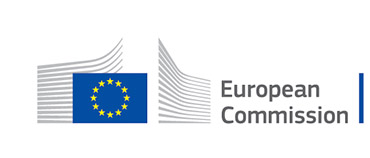|
|

|

|
| |
|
|

|
European Social Dialogue
Newsletter n° 12 - March 2021
|
|
|
|
|
|
Follow us
|
 |
|

|
|
|
|
|
Social dialogue highlights
|

|
|
► Report on strengthening EU social dialogue by Ms Andrea Nahles, Special Advisor on Social Dialogue to Commissioner Nicolas Schmit (03/02/2021).
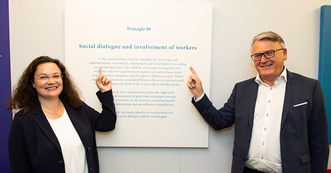
Thanks to her experience of social dialogue processes and labour market policies, as well as to numerous meetings and contributions by the social partners in the last six months, Ms Nahles‘ report proposes a set of concrete initiatives on social dialogue to implement the principle 8 on social dialogue of the European Pillar of Social Rights. Ms Nahles presented her report to the social partners at the Liaison Forum on 9 March.
Read more here
► The European Pillar of Social Rights Action Plan presented to EU social partners (09/03/2021).
The Director-General for Employment, Social Affairs and Inclusion, Mr Joost Korte, had an exchange with the sectoral social partners on the Pillar Action Plan at a meeting of the Liasion Forum on 9th March. He informed that following consultation with social partners in 2021, the Commission will present an initiative to support social dialogue at EU and national level in 2022.
The initiative will include the following four actions:
- the launch of a new award for innovative social dialogue practices;
- an information and visiting programme for young future social partner leaders;
- the review of sectoral social dialogue at EU level;
- a new supporting frame for social partner agreements at EU level.
These initiatives will be prepared and implemented in close cooperation with social partners.

The Director-General for Employment, Social Affairs and Inclusion, Mr Joost Korte, presented the European Pillar of Social Rights Action Plan to EU social partners at the liaison forum on 9 March.
Read more here
► EU leaders and social partners met on 24 March 2021, at the Tripartite Social Summit to discuss the question "how to achieve a fair and sustainable recovery?”. They intervened on following main topics:
- handling the health, economic and social crisis while maintaining emergency measures
- the contribution of social partners at EU and member state level for an economic and social recovery
- the road to Porto Social Summit
Read more here
|

|
|
|
|
|
|
News from the Commission relevant for the social dialogue
|

|
|
► Advancing the EU social market economy: adequate minimum wages for workers across Member States. The Commission proposed an EU Directive to ensure that the workers in the EU are protected by adequate minimum wages allowing for a decent living wherever they work. Negotiations with the Council and the European Parliament (28/10/2020).

Read more here
► The Pact for Skills: mobilising all partners to invest in skills. Commissioners Schmit and Breton have officially launched the Pact for Skills, a central element of the European Skills Agenda. They have also announced the first European skills partnerships in key industrial ecosystems – automotive, microelectronics, and aerospace and defence industries (11/11/2020).

Read more here
► The European Pillar of Social Rights: turning principles into actions The Commission sets out its ambition for a strong Social Europe that focuses on jobs and skills for the future and paves the way for a fair, inclusive and resilient socio-economic recovery (4/03/2021).

Read more here
► The Commission Recommendation on ‘Active and effective support for employment’ (EASE) was adopted together with the Action plan on the European Pillar (04/03/2021).
Read more here
► The European Commission has presented a proposal on pay transparency to ensure that women and men in the EU get equal pay for equal work (04/03/2021).

Read more here
► Union of Equality: European Commission presented Strategy for the Rights of Persons with Disabilities 2021-2030. This is an ambitious Strategy for the Rights of Persons with Disabilities to ensure their full participation in society, on an equal basis with others in the EU and beyond (03/03/2021).

© Getty Images
Read more here
|

|
|
|
|
|
|
Consultation of the social partners under Article 154 TFEU
|

|
|
Social partners were consulted on the initiatives in the social field:
► First phase consultations of the European social partners on the protection of workers from risks related to exposure to chemical agents at work and to asbestos at work to improve the prevention of work-related diseases by tackling existing, new, and emerging risks (17/12/2020).
You can read More here and here:
Ensuring a safe and healthy work environment for workers in the EU is a strategic goal set out in the Commission Communication on the EU Strategic Framework on Health and Safety at Work 2014-20202. One of the main challenges identified in this framework is to improve the prevention of work-related diseases by tackling existing, new, and emerging risks.
In her 2020 State of the Union address3, President von der Leyen underlined health as a top EU priority. Good occupational safety and health, including protection of workers from exposure to carcinogens, reprotoxins and other hazardous chemicals will contribute to this priority, and will also be an important contribution to ‘Europe’s Beating Cancer Plan’.
Social partners were consulted on the possible direction of EU action concerning revisions of Directive 98/24/EC4 on the protection of the health and safety of workers from the risks related to chemical agents at work (Chemical Agents Directive), the fourteenth individual Directive within the meaning of Article 16(1) of Directive 89/391/EEC5, as well as Directive 2009/148/EC6 on the protection of workers from the risks related to exposure to asbestos at work (Asbestos at Work Directive).
Furthermore, the Commission would like to identify possibilities to improve the existing EU legal framework in this field, and asked the social partners if they would consider initiating a dialogue under Article 155 TFEU on any of the issues identified.
► First-stage consultation of European social partners on how to improve the working conditions for people working through digital labour platforms and ask the views of European social partners on the need and direction of possible EU action to improve the working conditions in platform work (24/02/2021).

© Shutterstock / Gorodenkoff
Read more here
|

|
|
|
|
|
|
Consultation of social partners outside Art 154 TFEU
|

|
|
Dedicated hearings were organised to consult social partners on the planned initiatives
► On 4 November 2020, a dedicated hearing with social partners on the European Disability Strategy offered an opportunity for social partners to engage with the European Commission on the European Disability Strategy 2021-2030. The meeting was chaired by Neil Kerr, Head of Cabinet of Commissioner Dalli.
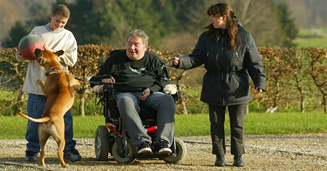
Read more here
►A dedicated hearing on sustainable corporate governance took place on 22 February 2021.
► New Pact on Migration and Asylum: The EU social partners and Commissioner Johansson exchanged opinions over how to best cooperate on the legal migration initiatives announced in the New Pact on Migration and Asylum, with a particular focus on Talent Partnerships. Participants discussed topics such as legal mobility schemes, economic growth and education pre-departure programmes (26/02/2021).

You can read more here and here
► On 16 March 2021, an exchange of views with social partners took place on the monitoring framework on access to social protection for workers and the self-employed.
► On 26 March 2021, a social partners hearing was organised on Seasonal Workers.
► Social partners hearings planned:
- April 12: Collective bargaining for self-employed,
- April 15: Initiatives on micro-credentials and individual learning account,
- April 21: Strategic Framework on Health and Safety at Work,
- Social Economy Action Plan (May/June 2021).
► Social partners also contributed to the design of the EU initiatives
The social partners from the Postal sector adopted a Joint contribution for the consultation on the Postal Services Directive.
|

|
|
|
|
|
|
COVID-19: Joint responses by the EU social partners
|

|
|
The social partners reported on their joint statements adopted in the context of the COVID-19 pandemic since October 2020.
Cross-industry
► Cross industry EU Social Partners, BusinessEurope, ETUC, CEEP and SMEunited, urged the Member States to endorse the agreement found on the recovery fund and long-term budget (18/11/2020).
Read more here
Multi-sectorial
► Recovery and Resilience Facility | Transport keeps us going forward, social partners representing the maritime, ports, inland-waterways, road, rail and air transport called on Member States and the European Commission to ensure that the transport sector receives adequate consideration in the National Recovery and Resilience Plans (10/02/2021).
Read more here
► Working together for a quick, safe & sustainable recovery of Europe’s hospitality sector - Food Service Europe, Hotels, Restaurants and Cafés in Europe (HOTREC) and EuroCommerce, with the European Federation of Food, Agriculture and Tourism Trade Unions (EFFAT) and UNI Europa, as well as other signatories, called for the immediate setting up of a hospitality task force across the EU Institutions to discuss the impact that COVID-19 has had on business and jobs and deliver a roadmap for the recovery of the hospitality sector and its value chain (27/01/2021).
Read more here
► European Services industry joined forces to strengthening social dialogue in building a resilient Europe - European Services’ social partners together adopted a statement on and hold a workshop of services’ social partners to strengthen European sectoral social dialogue Strengthening sectoral social dialogue in the services industry: The all-important role of social partners in building a resilient Europe. A seminar to exchange ideas followed in February and a meeting with Commissioner Schmit took place on 11 March 2021.
Nine social partners organisations* from the service sector issued a Joint Statement to strengthening sectoral social dialogue in the services industry. They highlighted the all-important role of social partners in building a resilient Europe and reiterated their commitment to keep on strengthening sectoral social dialogue in the services industry.
*EuroCommerce, Insurance Europe, Coiffure EU, World Employment Confederation-Europe, European Banking Federation, Confederation of European security services, European Federation of Cleaning Industries, European Telecommunications Network Operators’ Association, UNI Europa
Read more here
► European aviation and tourism sectors requires a coordinated approach to cross-border travel - Open letter to the Portuguese EU presidency. Ahead of the 1 March Extraordinary meeting of Ministers of Tourism, 14 European stakeholders in aviation and tourism urged the Portuguese presidency of the EU to put their efforts into the coordination of all restrictive measures related to COVID-19 (24/02/2021).
Read more here
Civil Aviation
► Recovery of European Aviation sector, a broad coalition of aviation stakeholders including employers, trade unions and NGOs signed up to the Aviation Round Table Report in November 2020. The aviation social partners, outlined the role aviation plays in the overall functioning of Europe´s economy and provided recommendations on how to restore European air connectivity, making sure other sectors that depend on aviation, such as tourism, can resume their activity.
The aviation social partners recently adopted three joint statements:
- Joint Statement by the European Social partners in Civil Aviation on COVID-19 inoculation for aviation workers (1/02/2021).
- Joint Appeal from Civil Aviation social partners on “unruly passengers” to EU Member States as incidents of unruly passenger behaviour on board aircraft continue to rise and the situation has been further exacerbated by new COVID-19 related measures, most notably the requirement to wear facemasks on board an aircraft (30/11/2020).
- Joint Statement by the European social partners in Civil Aviation on payroll support schemes for aviation in response to the COVID-19 pandemic (22/10/2020).

Link to the report
You can read more at the following links:
* EU social partners in the aviation sector: European Transport Workers’ Federation (ETF), European Cockpit Association (ECA), Air Traffic Controllers European Unions Coordination (ATCEUC), Airlines for Dialogue (A4D), Airline Coordination Platform (ACP), European Regions Airline Association (ERA), Airlines International Representation in Europe (AIRE), Airports Council International – Europe (ACI), Civil Air Navigation Services Organization (CANSO), Airline Services Association (ASA)
HORECA
► Joint Statement on Rebuilding the Hospitality Sector: The social partners are concerned about the economic recovery HORECA sector. HOTREC and EFFAT published a joint position highlighting the importance of the EU recovery plan and that it should be deployed as soon as possible. The social partners ask furthermore to extend all the emergency measures. Additionally they recommend to implement the guidance on health and safety by EU-OSH and other international organisations (27/11/2021).
Read more here
Maritime Transport
► The European Community Shipowners' Associations (ECSA) and the European Transport Workers' Federation (ETF) in their open letter, urged EU Member States to enable crew changes to take place without further delays and prioritise seafarers for vaccination (21/01/2021).
Read more here
► The maritime social partners requested the European Commission to follow up on prompt and predictable disembarkation of rescued people in distress at sea (14/12/2020).
Read more here
Railways
► The European Transport Workers Federation (ETF) and the Community of European Railway and Infrastructure Companies (CER) adopted a joint declaration on the impact of COVID-19 pandemic in the railway sector, the outstanding performance of the employees and the necessary measures for the future of the railways (03/12/2020).
Read more here
|

|
|
|
|
|
|
Joint outcomes by the social partners
|

|
|
Cross industry
► EU Social Partners BusinessEurope, ETUC, SGI Europe and SMEunited, adopted a European social partners’ joint contribution to the report by Andrea Nahles on social dialogue (18/12/2020).
They identified five main areas where further progress is needed:
- Strengthening the identification of broadly shared and consistent social affairs priorities at EU level
- Towards more meaningful social partners’ consultations by the Commission
- Improving the functioning and coordination of EU Social Dialogue Committees
- Improving social partner involvement in the recovery
- Time to act to strengthen capacity-building of social partners in the countries and sectors where this is needed
Read more here
► Joint statement on childcare provisions in the EU Cross industry social partners reminded that the social dialogue plays a role in developing practical tools to increase access and affordability to childcare, for example by creating joint funds by collective agreements to support childcare projects addressing specific needs of working parents in specific sectors, such as care for children with illness and disabilities, care outside regular opening hours. They issued recommendations to the Member States and the Commission.

Read more here
Multisectoral
► The European Network for Silica (NEPSI) 2006 social dialogue agreement success story, NEPSI Good Practice Guide for the application of the Agreement updated in 2020. The NEPSI agreement aims to protect the health of employees occupationally exposed to respirable crystalline silica in 18 industry sectors. The NPSI Guide helps to minimising such exposure by applying good practices, and increasing the knowledge and awareness about potential health effects of respirable crystalline silica as well as about good practices (5/02/2021).

© Shutterstock / Supavadee butradee
Read more here
Central Government Administrations
► The Central Government Administrations European social dialogue committee was created 10 years ago with the European Public administration Employers (EUPAE) and the Trade Unions’ National and European Administration Delegation (TUNED), the European Public Services Union (EPSU) in cooperation with the European Confederation of Independent Trade Unions (CESI). They adopted a Joint statement for the 10th anniversary of the EU Social Dialogue Committee (03/12/2020).
Social partners informed that taking into account the outcomes of the EU financed project “Improving work life balance: opportunities and risks coming from digitalization”, Spain has reached an agreement on telework with the most representative Trade Unions in Central Government Administration, setting the minimum working conditions for telework for Public Employees.
Read more here
Chemical Industries
► IndustriAll European Trade Union and the European Chemical Employers Group, representing the chemical, pharmaceutical, plastics and rubber industries, issued a joint statement on the Chemical Strategy for Sustainability. They welcomed the ambition of the European Commission to propose a comprehensive strategy for chemicals and called for the involvement of the Sectoral Social Dialogue Committee in any further development of the framework. The Social Partners highlighted that a future-proof strategy must equally address all three dimensions of sustainability: ecological, social and economic (27/10/2020).
Read more here
Construction
► European Federation of Building and Woodworkers (EFBWW) and the European Construction Industry Federation (FIEC) cooperate in the framework of the Decentralized Thematic Social Dialogue for the Construction Industry (DESOCO)
- a thematic workshop on “third country nationals and companies present on the EU construction market” – and the unlevel playing field that they are generating was organised in December 2020
- In February 2021, an other thematic workshop on “risk assessment in construction” was the opportunity for the Polish construction social partners to present their national system
EU-funded project “DESOCO”.
Extractive industry
► The European associations for the extractive industry*and IndustriAll-Europe, adopted “A long-term and ambitious EU Raw Materials Strategy”. They wish to strengthen the dialogue within the European Commission Raw Materials Supply Group and propose to adopt a long-term Working Programme with the 2050 perspective taking into account the above points (04/12/2020)
*European Association of Mining Industries (Euromines), the European Association for Coal and Lignite (EURACOAL), the European Industrial Minerals Association (IMA Europe), the European Aggregates Association (UEPG), the European Association of Potash Producers (APEP)
Read more here
Furniture
► On March 10th, the Furniture sector social partners organized the SAWYER project final conference forecasting the impact of the Twin Transition (Digital & Green) on the EU furniture sector in 2030. The on-line conference was well attended, featuring presentations by experts, EU social partners and the Commission. They presented the project outcomes forecasting the changes of jobs tasks, occupational risks, new and updated needs for skills, knowledge and competencies of 11 occupational profiles.
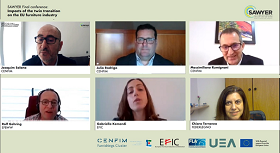
Link to video presentation
Gas
► Eurogas, IndustriAll and the European federation of Public Service Unions (EPSU), adopted a Joint statement on just transition, highlighting the need for the Just Transition Mechanism and the Industrial Strategy to be consistent and complementary in order to ensure that the transition succeeds in keeping integrated carbon-neutral industrial value chains and quality employment in Europe (23/11/2020).
Read more here
Hospitals and healthcare
► Hospital sector on strengthening the social dialogue in Central Europe The European Federation of Public Service Unions (EPSU) and the European Hospital and Healthcare Employers Association (HOSPEEM) will organise a webinar targeted towards their members from Croatia, Czech Republic, Slovakia, and Slovenia to review their priorities in the EU-level sectoral social dialogue and their involvement in the European Semester, collected via a survey and summarised in the form of country fact sheets (20/04/2021).

Read more here
Insurance
► The European social partners in the insurance sector, Insurance Europe, AMICE, BIPAR and UNI Europa, adopted a Joint declaration on Artificial Intelligence. Through this declaration, the social partners stress that AI is designed and used to enhance rather than replace human abilities (16/03/2021).
Read more here
Metal Industry
► Investing in a swift recovery of the European industrial, IndustriAll European Trade Union and the Council of European Employers of the Metal, Engineering and Technology-Based Industries (CEEMET) called on the EU and governments to keep on investing in Europe’s industrial basis as cornerstone for a swift recovery. The MET Social partners are ready to provide input for the development and implementation of the national recovery plans and to support the deployment of the Recovery Fund at national level and thus urge their national government to be given the opportunity to contribute to the design and implementation of these plans (30/11/2020).
Read more here
► The impact of digitalisation on the world of work in the MET industries, the social partners identified four areas in which social dialogue can shape the ongoing technological change to the benefit of both, employers and workers: work organisation, skills, occupational health & safety and data protection. With digital transformation happening at a different speed across regions and companies and in a context of rapidly changing technological parameters, the social partners express their firm belief that finding tailor-made solutions will become increasingly important (09/11/2020).
Read more here
Personal services
► In their last Joint Statement, the social partners in the hairdressing sector (Coiffure EU and UNI Europa), welcome the cooperation between the European Commission, the European Agency for Occupational Health and Safety at work (EU OSHA) and the social partners regarding the autonomous implementation of their European Framework Agreement on health and safety signed in 2016 (02/12/2020).

© Unai Huizi Photography / Shutterstock
Read more here
In the joint statement the social partners confirm that the following actions have been engaged in good cooperation:
- improve the effective enforcement of the EU Cosmetics Regulation and raise awareness to ensure safety of cosmetics used in the hairdressing sector
- improve occupational health and safety situation in the hairdressing sector by possibly reviewing the Guidelines relating to the Regulation 2016/425 on Personal Protective Equipment (PPE)
- develop sector guidance to support the practical application of the SPA for workers and employers in the hairdressing sector.
- consider the SPA in the activities developed by EU OSHA
- cooperate with the Senior Labour Inspectors’ Committee (SLIC)
A project to support the implementation of the Framework Agreement on health and safety was granted through the social dialogue call for proposals for “promoting the autonomous implementation of the European framework agreement on occupational health and safety in the hairdressing sector”. The project has two main strands:
- research for the identification and prioritisation of hazardous and harmful chemical substances contained in cosmetic products
- promotion and monitoring of the autonomous implementation of the agreement at national level
The social partners monitor the implementation of the agreed activities in the framework of the Sectoral Social Dialogue Committee on personal services.
Postal services
►PostEurop, UNI Europa and the European Confederation of Independent Trade Unions (CESI) adopted a Joint Contribution of European Social Dialogue in the Postal Sector to the consultation on the Postal Services Directive (13/11/2020).
► The project “Postal Skills and Work Environment in the Digital Era” of the SDC for the European Postal Sector investigates specific digital skills of the sector and analyses the relationship between workers and highly digitized work environment also for health & safety purposes. The first questionnaire on back office activities was launched and interviews with postal experts are started. The project is funded under the call for proposal to support the social dialogue (VS/2019/0441).
Joint Contribution of European Social Dialogue in the Postal Sector to the consultation on the Postal Services Directive
|

|
|

|

|
|
Road
► Joint Recommendations on Digital Transformation and Social Dialogue in Urban Public Transport in Europe, the International organisation for public transport authorities & operators (UITP) and the European Transport Workers' Federation (ETF) are committed to shaping the digital transformation of UPT by promoting social dialogue at all levels. They agree to use the digital transformation process as a lever to further develop high-quality mobility to better serve customers and reinforce the central role of public transport as the backbone for sustainable urban mobility services in line with the objectives of the European Green Deal (18/03/2021).
Read more here
► International Road Transport Union (IRU), European Transport Workers’ Federation (ETF) with the European Shippers’ Council (ESC), adopted a Charter on improving the treatment of drivers at delivery sites. They invite all stakeholders to sign the Charter and commit to improving the treatment of drivers at company premises (25/11/2020).
Read more here
The Charter adopted by IRU, ETF and European Shippers Council (ESC), aims at improving the treatment of drivers at loading and unloading sites and thereby improve working conditions, increase operational efficiency, and ultimately, contribute to making the driving profession more attractive. The Charter is an invitation to all stakeholders to sign and to launch national campaigns for the promotion of the Charter.
Charter web site
Sea fisheries
The sea fisheries social partners (ETF, Europêche and Cogeca) have been relentlessly advocating for better protection of the fishers’ rights across the EU and beyond. On 20 November 2020 ETF and Europêche, in cooperation with the International Labour Organization (ILO), the European Commission and authorities of Denmark, France, the Netherlands and the United Kingdom, hosted a webinar calling for the ratification and implementation of the ILO Work in Fishing Convention (C188). In the same context, the social partners issued a Resolution on human rights and labour abuses in certain Asian fleets and urged the Food and Agriculture Organisation of the United Nations (FAO) to make progress on the social dimension of fisheries to ensure sustainability at a global level and involve social partners in the process.
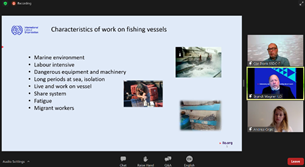

Sugar
► The European Committee of Sugar Manufacturers (CEFS) and the European Federation of Food, Agriculture and Tourism Trade Unions (EFFAT) published a joint statement EU policies need to be coherent to ensure a just transition, highlighting the situation of the sugar sector in international trade. The social partners stressed that the sector has been hit hard by the end of the third countries import quotas. They demand the EU institutions to establish coherent policies and ensure just transitions (8/02/2021).
Read more here
Telecommunications
► The European Telecommunications Network Operators' Association (ETNO) and UNI Europa, adopted a Joint Declaration on Artificial Intelligence (AI), to stress the essential role to play by the social partners, contribute to the general debate on AI and to provide guidance to the sector regarding the opportunities and the risks that AI represents (30/11/2020).
Read more here
► Temporary agency work social partners, WEC-Europe and UNI-Europa, adopted a Joint recommendations on social innovation based on a social dialogue research EU-funded project (VS/2019/0034), presented at an event with the presence of the Commission (01/12/2020).
A research project led by CEPS and the Catholic University of Leuven/HIVA analyses the success factors and potential for replicability of initiatives put in place by social partners in the agency work sector to improve training, working conditions and social protection of workers. The findings were discussed during an online event.
More information is available here:
Woodworking
► The European Federation of Building and Woodworkers (EFBWW), the European Confederation of woodworking industries (CEI-Bois) and other stakeholders adopted a joint opinion regarding the Commission’s Communication “A Renovation Wave for Europe - greening our buildings, creating jobs, improving lives”. The signatories welcome the Communication and support some of the Commission proposals (03/11/2020).
Read more here
|

|
|
|
|
|
|
News from the EU agencies / Institutions / International organisations
|

|
|
ECJ
► General advocate opinion was issued on 20 January 2021 in the case C 928/19 P on the appeal brought by EPSU against the judgment of the General Court of the European Union of 24 October 2019 in case T-310/18, by which the General Court dismissed the action for annulment brought by EPSU and Mr Jan Goudriaan against the decision adopted by the European Commission in its letter of 5 March 2018 refusing to submit a proposal for a decision implementing an agreement between the social partners to the Council of the European Union.
ELA
► ELA Work programme 2021 includes undertaking support actions for information to employers and workers in specific sectors. Priority will be given to target groups or sectors most in need in the context of the aftermath of the COVID-19 pandemic, such as cross-border and seasonal workers and will also include road transport application and effective enforcement of the legislative provisions of the Mobility Package.
Read more here
EUROFOUND
► COVID-19 crisis led to doubling of EU restructuring job loss in first six months of 2020
The COVID-19 crisis has led to a doubling of restructuring job loss in the first half of 2020 compared to the rolling average. The labour market impacts have been highly selective, with two broad sectors – transport (including air transport) and hotels and restaurants – accounting for nearly half the overall announced job loss compared to less than 10% in ‘normal’ times. The new European Restructuring Monitor ERM report 2020: Restructuring across borders reviews recent restructuring activity in the EU, from January 2019 up to and including the first impacts of the COVID-19 crisis. It also presents an analysis of transnational restructuring cases – those that affect workers in more than one country (11/11/2020).
EU-OSHA
Stop the pandemic: Update to EU guidance on adapting workplaces and protecting workers in times of COVID-19
EU-OSHA has released a revision of the occupational safety and health EU guidance that was published last year. The document is available in 25 languages and it includes examples of measures, which can help employers achieve an appropriate safe and healthy work environment when undertaking or resuming activities.
Read the updated EU guidance
A new set of social partners join the Healthy Workplaces Lighten the Load Campaign
The official campaign partners and media partners supporting EU-OSHA’s campaign on work-related MSDs are crucial to help and prevent them through the promotion and exchange of good practices. EU-OSHA also supports the EU initiative CHRODIS PLUS to strengthen the inclusiveness of workplaces and the work ability of employees with chronic conditions. Get to know the partners
OiRA tools – a decade of navigating occupational risks and beyond
Over 147,000 risk assessments have been carried out with EU-OSHA’s Online interactive Risk Assessment platform – OiRA – by micro and small enterprises all over Europe during the past decade. 58 new OiRA tools were published in 2020, increasing the total number to 239. To help keeping employees safe and healthy during the pandemic, 15 national OiRA COVID-19 tools have been developed.
Trends and implications for workplace safety and health in the agriculture and forestry sectors
A new report provides a snapshot of the findings of EU-OSHA’s foresight project on the organisational and technological changes facing the agriculture and forestry sector, and the resulting challenges for occupational safety and health. The sector has one of the highest accident rates in Europe. The report concludes with recommendations for future research and policy-making.
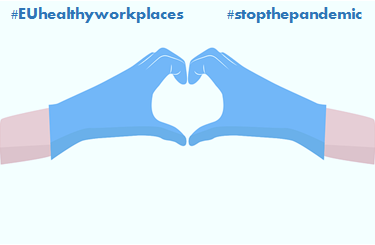
ILO
ILO reported on the analysis of the activities of employer and business membership organizations in the COVID-19 pandemic and what comes next. Employer and business membership organizations (EBMOs) across the globe have been at the forefront of helping the businesses they represent to weather the COVID-19 crisis. EBMOs around the world have stepped up to deliver crucial services and amplify the business voice amid the sheer enormity of the COVID-19 crisis (25/01/2021).
Read more here
MoveS Network of independent legal experts in the field of intra-EU mobility.
► Citizens can explore the field of EU social security coordination through A-Z/FAQs facility, the ‘A-Z of social security coordination (FAQs)’ is a facility setting out the basic principles and frequently raised issues in the field of EU social security coordination. The information is structured around keywords and provides answers to specific questions as well as plenty of practical examples and links to further information sources.
Read more here
The ‘A-Z of social security coordination (FAQs)’ is a facility setting out the basic principles and frequently raised issues in field of social security coordination.
You are invited to first read the introduction into the theory of social security coordination and the coordination instruments of the European Union.You will then find more in-depth information structured in 70 keywords. Each keyword provides answers to specific questions and includes plenty of practical examples and links to further information sources to guide you through this complex topic.
Some keywords provide you with specific definitions (e.g. self-employed person, frontier worker), while others explain the legislative aspects of certain procedures (e.g. cross-border medical care, posting of workers).
You can use this tool to expand your own knowledge or to find the answer to practical questions. All you have to do is click on the relevant keywords below in order to see more detailed information.
|

|
|
|
|
|
|
Calls for proposals
|

|
|
► 2020 calls for proposals in the social dialogue field:
- Strengthening the role of social partners in mitigating the economic and social impact of the COVID-19 crisis, 5 millions of extra support. Deadline for submitting proposals is 26/04/2021.
- Information and training measures for workers' organisations: 34 applications received, 20 projects selected for an amount of 5,46 million euro.
- Support for social dialogue: 36 applications received 27 selected for an amount of EUR 9,33 million euro.
- Improving expertise in the field of industrial relations: award to be completed shortly.
An information day for project owners will be organised in spring 2021.
► 2021 calls for proposals in the social dialogue field will be managed in a new system, with paperless submission of applications called eGrants system.
- The call for proposals for information and training measures for workers' organisations will be published for an amount of 5,93 million euro.
- Support for social dialogue call for proposals will have an amount of 15,93 million euro. It will include two new priorities, related to the impact of COVID-19, (1) strengthening capacity of national social partners and (2) technical assistance by EU cross-industry social partners to national social partners.
- The industrial relations call will have a budget of 4,15 million euro and is expected to be published end April 2021.
Funding for social dialogue page
|

|
|
|
|
|
|
Social Dialogue Meetings / other news
|

|
|
With the outbreak of COVID-19, restrictions on travel and the rules for social distancing, meetings of social dialogue committees continue to be organised with teleconferencing until further notice.
|

|
|
|
|
Send us your contribution
You have a contribution for the next edition of the newsletter? Please contact the editor.
We also look forward to your comments and suggestions.
Disclaimer
The views expressed in this newsletter are those of the authors and do not necessarily reflect the views of the European Commission. Neither the European Commission nor any person acting on behalf of the Commission may be held responsible for the use that may be made of the information contained in this newsletter.
If you wish to unsubscribe from the Social Dialogue newsletter mailing list, please send us an email.
Publisher
European Commission,DG Employment, Social Affairs & Inclusion, Social Dialogue Unit
Contact | Legal notice
|
|
 |
|
